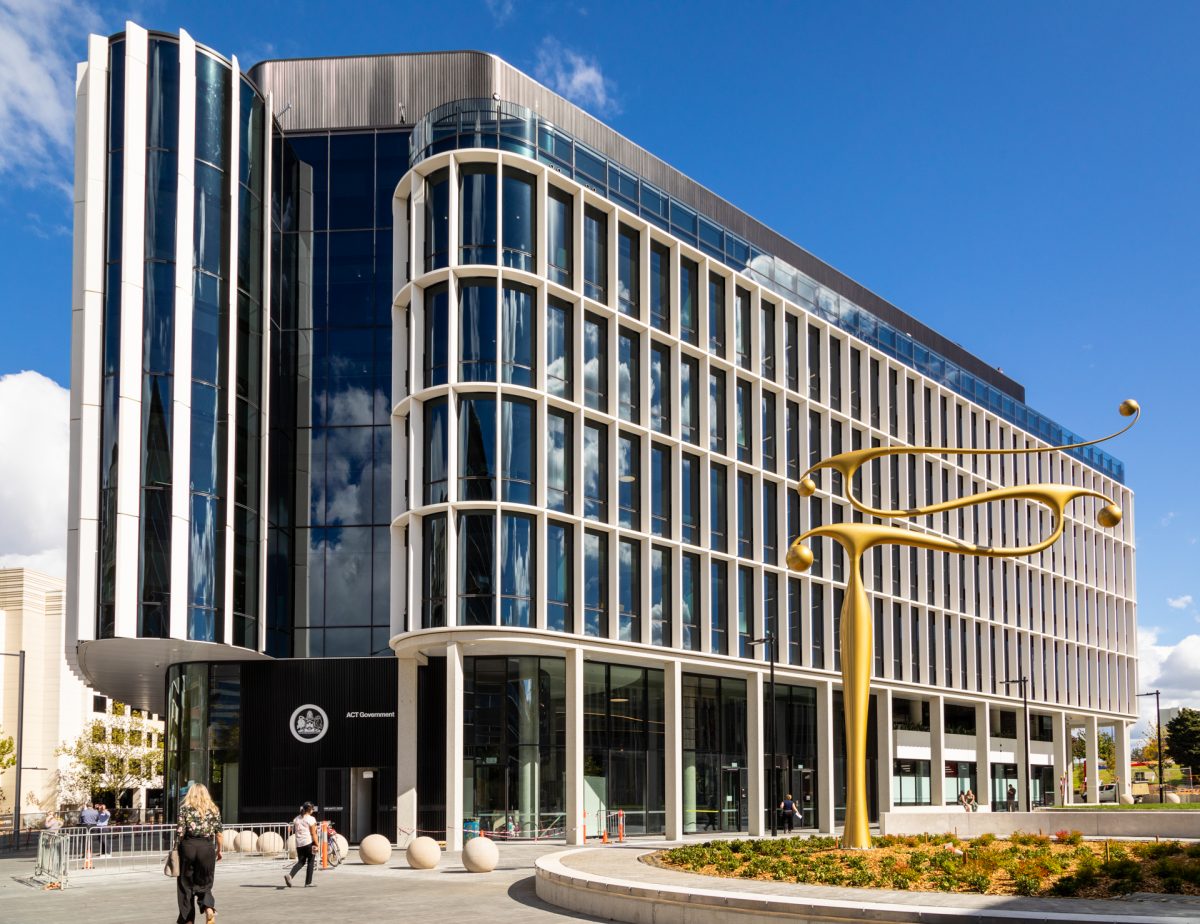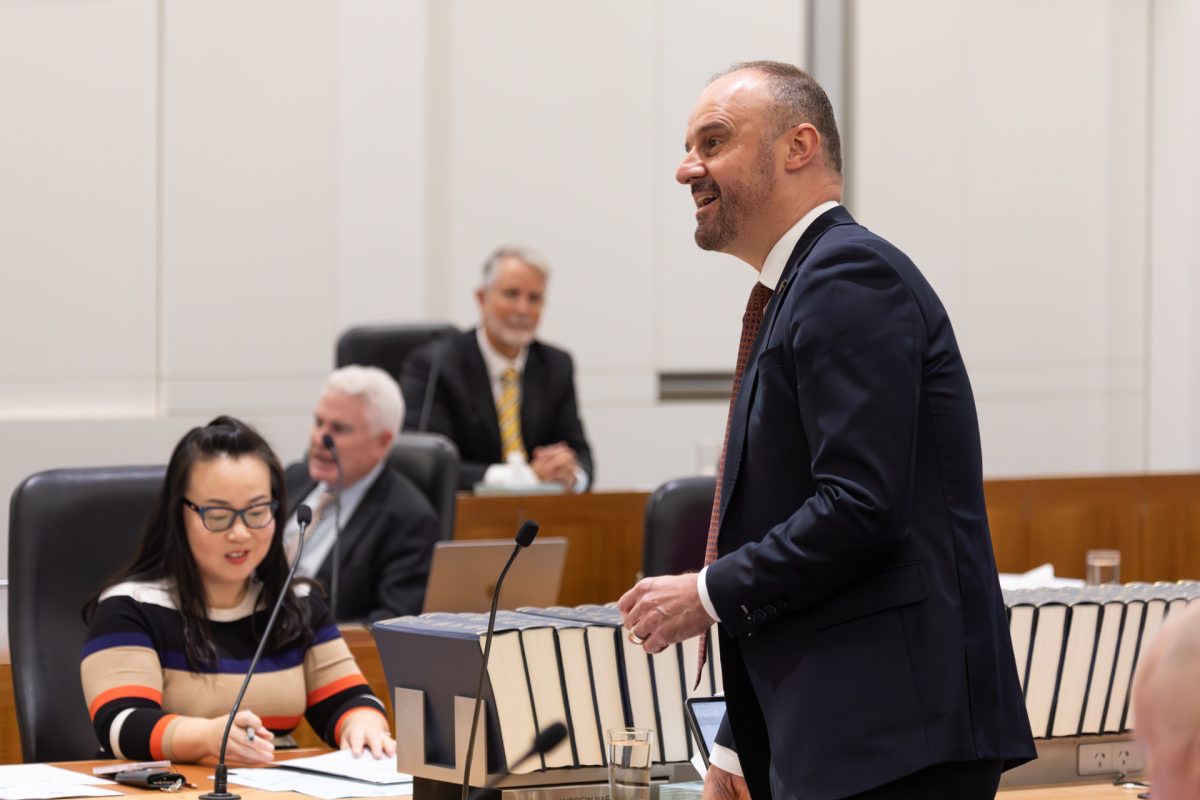
The ACT Government building in the CBD. Working arrangements aren’t about to change. Photos: Michelle Kroll.
The Property Council has called it a bold move but Chief Minister Andrew Barr has given his NSW counterpart’s back to the office edict short shrift.
NSW Premier Chris Minns has told public servants that they should work “principally” from their on-site workplace, moving away from working-from-home arrangements.
In a memo circulated to departments on Monday, affected employees were mandated to work primarily in an approved office, workplace or related work site.
Individual agencies have been left to develop and implement their own policies, and flexible working arrangements will remain in place, particularly for people with carer responsibilities, but the move has many wondering if this is the beginning of the end of the work-from-home practices left over from the pandemic.
The Property Council and business lobbies have been calling for an end to working from home as office vacancy rates climb and CBD businesses suffer from the falloff in foot traffic.
Property Council ACT acting executive director Katie Stevenson said the ACT should follow Mr Minns’ lead.
“This is a bold move by the NSW Premier and we’re calling on the ACT to follow suit,” she said.
“Just last week, the Property Council flagged concerns about growth in Canberra’s office vacancy rates to 9.5 per cent, well above the historical average of 7.6 per cent.
“We need Canberra’s CBD to be vibrant and attractive every day of the week, and the government has a clear leadership role to play in getting public servants back behind their desks.”
However, Mr Barr said the public sector’s role was to deliver services to the public, not to fill offices.

Chief Minister Andrew Barr: the public sector’s role was to deliver services to the public, not to fill offices. Photo: Michelle Kroll.
Mr Barr said that if the property sector was worried about vacancy rates, landlords should consider lowering their rents.
He said the ACT would stick with its current arrangements for office staff.
“We’re very comfortable with the balance of where our staff are located across the city, and that includes CBD town centres and group centres,” he said.
“And we’re expanding our flexible workplace opportunities so that people can work in an ACT Government building nearer to where they live.
“We also have flexibility around the balance of in-office and work-from-home arrangements.”
However, Mr Barr said the government was supportive of bringing more residents into the CBD and town centres so that there would be a better mix of activities.
“So it’s not just nine to five, but there are people, events and activities occurring outside of core business hours,” he said.
However, a change in Australian Public Service policy would have the greatest impact on Canberra, although that seems unlikely.
Federal Public Service Minister Senator Katy Gallagher declined to comment, but the Australian Public Service Commission noted that flexible working arrangements for Commonwealth employees were provided for under the Fair Work Act 2009 as opposed to State and Territory legislation and employment instruments.
“A common flexible working arrangements clause is contained in APS enterprise agreements negotiated in APS service-wide bargaining,” a spokesperson said.
“The APSC will continue to monitor how the clause is operating.”
The public sector union said flexible work rights were in APS employees’ enterprise agreements that were negotiated by the CPSU.
CPSU National Secretary Melissa Donnelly said the CPSU negotiated industry-leading rights for APS workers to access flexible work arrangements, including working from home, in all APS enterprise agreements in the last round of bargaining.
These included new provisions for no caps on the number of days an employee can work from home, a bias towards approval of applications, and decisions subject to independent oversight and review rights.
“These new provisions set the APS up as a model employer in providing flexibility for employees to achieve better work/life balance and will help attract and retain staff,” Ms Donnelly said
“Since negotiating the new agreement provisions, CPSU representatives have successfully supported members across the APS to access their rights, including support in making individual applications and review of management decisions.”
The NSW move has also brought a cheeky response from the Victorian Government.
“Any public servants from New South Wales who like flexibility in their workplace should consider moving to Victoria,” a statement from Premier Jacinta Allan’s office said.



















